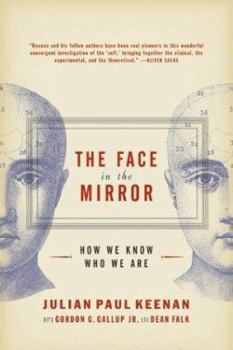The Face in the Mirror: How We Know Who We Are
Select Format
Select Condition 
Book Overview
We've all witnessed this moment: a dog, a cat, or another animal reacting to its own reflection in the mirror, treating it as another animal to be played with or confronted. As human beings, we take self-recognition for granted, but this seemingly simple ability represents one of the most complex mysteries of neuroscience. The Face in the Mirror takes readers on a lively tour of the neurological, anthropological, and psychological roots of self-recognition...
Format:Paperback
Language:English
ISBN:0060012803
ISBN13:9780060012809
Release Date:July 2004
Publisher:Harper Perennial
Length:304 Pages
Weight:0.60 lbs.
Dimensions:0.7" x 5.2" x 8.0"
Customer Reviews
5 ratings
Interdisciplinary study
Published by Thriftbooks.com User , 15 years ago
Thomas Nagel has pointed the diffucties faced by philosophy because of our dual view (subjective and objective) of the world. I think science also faces the same problem. J. P. Keenan's area of research is just on top of this (geological) fault. Keenan chooses rightly to study the observable (behavioral) phenomena associated with our sense of self awareness and the associated complex of subjective phenomena, like our sense of continuity in time, and mind theory. The strenght of the book lies in a multy disciplinary approach. Experiments from pschology, neurological studies of pathologies associated with the self, child developmental studies experiments with animals and different brain imaging techniques are presented in a coordinated way. If as can be expected no proof is offered for the two central thesis: 1- The face in the mirror test is strongly correlated with self awareness 2- The right brain may be the dominant partner in our self consciousnes. A reasonable and well argued case is presented. It is only at the end, where J. P.Keenan speculate on the role of evolution in the genesis of our self awareness and the possible survival value of our self conciousness that in my opinion he goes astray and offers our capacity for deception as the main benefit. This seems highly unlikly as in the small protohuman groups living in the pleistocene a "deceiver" would have been found out and rejected by his clan, not an outcome leading to a high probability for survival. Another possibility that he rejects, that our self awareness and the attached sense of continuity is the basis for our capacity to imagine future senarios and plan accordigly may be a much better help for survival. It may be also that "the theory of mind" is one of the bases for our ability to understand and use language.
A really nice addition
Published by Thriftbooks.com User , 20 years ago
This book is written at the mid-level. The author (s?) make the information easier to tackle by using humor and basic experience. I think they were aware that this material is not meant for everyday readers. The book really takes off when discussing cases and what it is like to be a neuroscientist. The last chapter really pulls everything together. A good book.
Better than most
Published by Thriftbooks.com User , 20 years ago
Sometimes funny and amusing, this book serves up the brain and the state of the art of consciousness. Enjoyable to the science reader. A nice read for anyone interested in the brain and the self.
Fascinating!
Published by Thriftbooks.com User , 21 years ago
Keenan has written an interesting, even exciting, account of the brain and our sense of self. I never realized how much I didn't know about the brain until now, through the patient profiles modern day neuroscience comes to life. Wow!
A Wonderful Read
Published by Thriftbooks.com User , 21 years ago
The author knows his stuff. Very interesting and even funny in places. Finally, a focused work that has data, not speculation.





